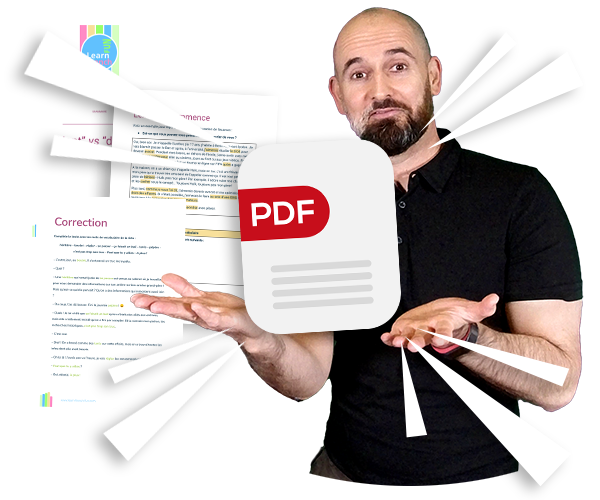If you are reading this article, you have already solved this problem: why do I have to learn French?
DELF is a French certification that was first established in 1985 by the French National Ministry of Education. DELF examinations focus on four main areas:
- Reading (compréhension écrite),
- Writing (production écrite),
- Listening (compréhension orale),
- Speaking (production orale).
DELF examinations are composed of four tests corresponding to these areas. DELF is the acronym for Diplôme d’Études en Langue Française.
- What is DELF and what does it test?
- Example of questions you could be asked in the DELF A2 on the theme of the family and the answers you could give:
- Example of questions you could be asked in the DELF A2 on the theme of the studies and the answers you could give:
- More advice on the French DELF A2 oral exam
- How to prepare for the DELF exam?
- Tips for passing the DELF exam
- What you need to know about DELF in France (including where to take your exams)
- The DELF Exam is a great way to certify your French language skills!
DELF examinations are offered around the world by education centers, universities, and also DELF examination centers on all five continents. DELF exams were designed to test for competency in French language rather than proficiency in a specific field.
What is DELF and what does it test?
DELF exams focus on four main areas: French reading, French writing, French listening and French speaking:
Reading DELF – Compréhension écrite
- DELF reading tests ability to understand and analyze written texts.
- DELF reading tests the comprehension of connected discourse.
- DELF reading aims for a quote to be understood and explained, and has an open-ended structure
- DELF reading also requires the identification of explicit meaning as well as implicit meaning.
- The DELF Reading test includes a passage that is followed by questions that test for understanding of the content.
- DELF reading tests the four language skills: vocabulary, syntax, morphology and cohesion.
- DELF reading tests various types of texts such as newspaper articles, short stories, non-fiction books.
- DELF requires a good preparation time to prepare efficiently.
Writing DELF – Production écrite
- Writing tests ability to present opinions or facts in a written text.
- DELF writing aims at testing ability to create clear and coherent discourse.
- DELF writing should follow a structure which starts with an introduction followed by body paragraphs containing several sentences. The last paragraph should summarize all main points DELF writing also aims at evaluating the candidate’s critical thinking.
Tips
1. Make sure you know the DELF format
2. Get a good study
💡We have prepared an FAQ with all the questions that candidates usually ask when taking the DELF exam: read the DELF FAQ.
Do you like learning French with videos?
Receive our free video newsletter every Friday in your e-mail box. You will get 3 “Tips & Tricks” on grammar, vocabulary, phonetics or French culture.
👉👉 Sign up now!
Listening DELF – Compréhension écrite
- DELF listening tests ability to understand and analyze spoken texts.
- DELF listening tests comprehension of connected discourse, as well as the recognition of implied information.
- DELF listening focuses on oral comprehension through oral language understanding.
- DELF requires a high level of attention, since students will need to understand all information given orally via audiovisual. It means that DELF listening does not require active participation from the test-taker.
- DELF listening lasts for 30 minutes. It depends on the level prepared (A1, A2, B2 or B2)
- DELF listening is a closed book exam.
Speaking DELF – Production orale
- DELF speaking tests ability to express oneself orally.
- DELF speaking assesses fluency, coherence, lexical choice and grammar.
- For example, for the DELF B2, DELF speaking is assessed through two parts:
- a monologue (speaking about personal experiences, opinions on the subject of the proposed article)
- and a dialogue (a conversation with the examiner about the arguments and information presented in the monologue).
- DELF speaking requires students to demonstrate their ability to sustain a conversation on a variety of topics.
- DELF speaking also evaluates pronunciation and intonation.
Example of questions you could be asked in the DELF A2 on the theme of the family and the answers you could give:
✔️ Ecoute & lis…
Sur le thème de la famille
- As-tu des frères et sœurs ? Comment s’appellent-ils ? Quel âge ont-ils ?
Oui, j’ai une petite sœur qui s’appelle Sophie. Elle a huit ans.
- Comment est ta relation avec tes parents ?
J’ai une très bonne relation avec mes parents. On s’entend très bien.
- Est-ce que tu as un animal de compagnie ?
Oui, j’ai un chat qui s’appelle Minou. Il est très mignon.
- Quel est ton souvenir le plus marquant en famille ?
Mon souvenir le plus marquant en famille, c’est quand nous avons fait un voyage en France l’été dernier. C’était très amusant.
Source : YouTube @LearnFrenchFun
Example of questions you could be asked in the DELF A2 on the theme of the studies and the answers you could give:
✔️ Ecoute & lis…
Sur le thème des études
- Qu’est-ce que tu étudies ?
J’étudie la médecine car j’aime aider les gens et j’ai toujours été intéressé(e) par le domaine médical.
- Pourquoi as-tu choisi cette filière ?
J’ai choisi cette filière car je veux devenir enseignant(e) et j’aime travailler avec les enfants.
- Comment sont tes professeurs ?
Mes professeurs sont très compétents et ils sont toujours prêts à aider les étudiants.
- Quels sont tes projets d’avenir ?
Mes projets d’avenir sont de trouver un emploi dans mon domaine d’études et de réussir ma carrière professionnelle.
- Est-ce que tu étudies beaucoup ? Combien de temps par jour ?
Oui, j’étudie beaucoup car je veux obtenir de bonnes notes et réussir mes examens. Je passe environ 3 heures par jour à étudier.
Source : YouTube @LearnFrenchFun
More advice on the French DELF A2 oral exam
How to prepare for the DELF exam?
As the DELF exam dates near, some students may feel overwhelmed and not sure how to prepare.
The DELF exam is not something to be taken lightly. If you want to pass, you need to be prepared. Here are some tips to help you get started.
First, familiarize yourself with the format of the exam. As we have seen, there are four sections- listening, reading, writing, and speaking. Each section has its own set of rules and regulations. Make sure you know what is expected of you before you walk into the exam room.
Second, brush up on your language skills. The DELF exam tests your ability to use French in a real-world setting. If you can’t conjugate verbs or string together a coherent sentence, you’re going to have a tough time passing the exam. 😱

PDF Bonus
We have prepared a free PDF to help you prepare for your French DELF oral exam. 👉 Download it for free
You will find the list of all the questions with the answers to give + tips for each question.
And at the end, you will have an exercise to practice with the correction.
| ✔️ I always recommend that my students write (for the DELF written production) or say (for the DELF oral production) at least one sentence with the relative pronoun “dont“. Why? Because it is a relative pronoun that few students master and showing the examiner that you have understood it and can use it is a very positive point. By the way, we have prepared an article with a video that explains in detail how to use the relative pronoun dont and what differences there are with duquel. |
Third, practice, practice, practice. Take as many practice exams as you can get your hands on. The more Practice exams you take, the better prepared you’ll be for the real thing.
Finally, relax and don’t stress out. The DELF exam is important, but it’s not the end of the world if you don’t pass.
Keep these tips in mind and you’ll be well on your way to passing the DELF exam.

Tips for passing the DELF exam
The French DELF exam is a test that many students are required to take in order to get into the best universities. It’s not an easy thing to do and it can be pretty intimidating, but with these tips you’ll be able to pass without too much of a hassle!
Tip 1 for passing the DELF exam: Keep up on your grammar
Even if you’re fluent in French, the grammar rules will still need some attention. Practice them as often as possible and make sure you know all of them for each level
Tip 2 for passing the DELF exam: Spend time reading
One of the most important things about passing this test (or any other language exam), is knowing how to read and understand what you’re reading. If you’re having trouble reading in your native language, you’ll have even more trouble understanding what’s being said.
Tip 3 for passing the DELF exam: Know how DELF is scored
DELF tests are scored on a scale, so it’s good to know where your level of French falls on the scale. It will also help if you know what DELF score is required for your chosen school or program.
💡 We have made a small French test to help you have an idea of your real level in French and not only of your school level, which unfortunately, is only too often based on your grammatical knowledge in French.
Tip 4 for passing the DELF exam: Practice, practice, practice
This one is pretty self-explanatory. The more you practice, the better you’ll do on the test. Try to find DELF practice exams and simulations to get a feel for what the real test will be like.
It is very easy to find free ones on the Internet. Ask our friend Google : “annales examen DELF“. And you will have the possibility to practice in real conditions.
Tip 5 for passing the DELF exam: Get help if you need it
Sometimes it’s hard to do everything on your own, especially when it comes to preparing for an exam. If you’re feeling overwhelmed or lost, don’t be afraid to ask for help from a friend, family member, or tutor. They can give you the extra push you need to pass the DELF!
I have been a DELF examiner for almost 8 years and Priscilla has over 25 years of experience and is a member of the EAQUALS jury. If you need lessons, we are here. 😆😀
So there you have it! With these tips in mind, you will have success!
What you need to know about DELF in France (including where to take your exams)
I bet you’re reading this because you’re wondering what the heck DELF is. Well, I’m here to tell ya! (I also might be your teacher). DELF stands for Diplôme d’Études en Langue Française which loosely translates to “Certificate of French Language Study“.
There are currently four levels of DELF exams: A1, A2, B1 and B2. You can take any level at any time. You can just go straight on to DELF B2 after DELF A2. I’m not making this clear am I? Anyone else confused?
Time for a break picture of a cute dog: 😂
See if this helps:
You gotta know the levels like abc – one is lower than the other, but it doesn’t really make sense… Like does “B” come before or after “A”?
So basically there are four DELFs (levels) and they start by getting harder as you move up: DELF A1, DELF A2, DELF B1 and DELF B2. After, it’s DALF. DALF C1 and DALF C2. If you have the DALF C2 level we can say that you are a native speaker. And maybe even better than native…
You can just go straight from DELF B1 to DELF B2 without taking DELF A2!
Testing dates (when DELFs are offered): it depends from your country! Contact the examination center closest to you.
The DELF Exam is a great way to certify your French language skills!
In order to certify your French language skills, you may want to take the DELF exam. Read on for everything you need to know about this qualification and how it can help improve or even start a career in France!
You’ll also find some helpful tips from our team of experts at Learn French Fun’s blog so that you can prepare yourself for success before taking the test.
And if all else fails? There will be plenty more opportunities where that came from–DELF exams are offered around the world by education centers, universities, and also DELF examination centers on all five continents.
We hope we’ve helped answer any questions you might have had about this certification process and wish everyone good luck with their future studies!
Articles that might interest you:
- What is included in the DELF A2?
- FAQ on the DELF French exam
- French Exam DELF B1: Everything You Need to Know
- Everything you need to know about DELF
- The DELF and TCF French exam: what’s the difference?
- How are French DELF B2 students graded?
- The Difference Between the DELF and DALF French Language Proficiency Exams




